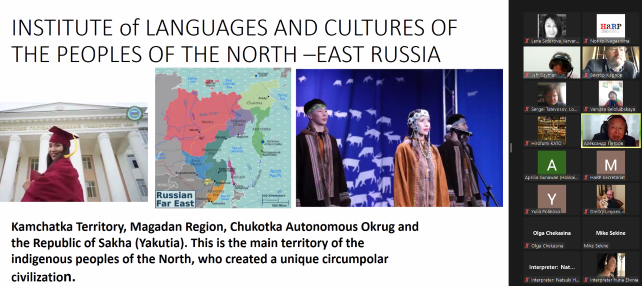Here is the report by Dr. Jeff Gayman (Professor, School of Education/ Research Faculty of Media and Communication), the organizer of the event.
Report:
The online workshop, “Language and cultures of ethnic minorities in higher education in Russia and Japan”, of 15 September, 2021, held during the Japan-Russia Scientific Forum, was collaboratively sponsored by Hokkaido University, Lomonosov Moscow State University, and the Association of Institutions of Higher Education of Russian Federation and Japan, with co-sponsorship by the Human Resource Development Platform for Japan-Russia Economic Cooperation and Personnel Exchange (HaRP, in particular, the specialized section “SDGs: Environment, Resource Development and Multicultural Education”), North-Eastern Federal University in Yakutsk, the Hokkaido University Research Faculty of Media and Communication, and the Hokkaido University School of Education. This workshop was one of 4 sessions of the Japan-Russia Scientific Forum held with the aim of promoting Japan-Russia academic collaboration for the achievement of Sustainable Development Goals (SDGs). It was inspired by the results of the following seminars which were co-organized by the Japanese participants of the specialized section “SDGs: Environment, Resource Development and Multicultural Education” and their Russian counterparts:
- “Cold Lands Seminar. Session 4: Humanities (education for sustainable development and representation of indigenous peoples)” held on 27 September 2019 in conjunction with the Cold Land Seminar/Northern Sustainable Development Forum, 2019.
- “Indigenous Media: Development Strategies” held on 29 September 2020 in conjunction with the Cold Land Seminar/Northern Sustainable Development Forum, 2020.
- Online workshop “Indigenous Peoples of Asia-Pacific and Far East of Russia: Cultural Identity and Media” held on 12 February 2021.
These seminars and the 15 September workshop shared the common purpose to strengthen cooperation between Japanese and Russian universities to achieve the SDGs and contribute to the development of indigenous culture, and to involve indigenous peoples in the discussion of implementation of the SDGs. The objective of the 15 September workshop was to examine the current state and opportunities for the development of indigenous education in higher education in both countries, particularly the extent to which existing educational models contribute to the development of indigenous language education and research and SDGs in general. The workshop was attended by approximately 65 individuals from Japan, Russia, Spain, Finland, and Canada.
The workshop consisted of presentations and commentaries by six academics, Jeffry Gayman and Hirofumi Kato of Hokkaido University, Alexander Petrov of Herzen State Pedagogical University, Varvara Beloliubskaya of North-Eastern Federal University in Yakutsk, and Viktor Karlov and Sergei Tatevosov of Moscow University, with moderation by Lena Sidorova of North-Eastern Federal University. Professor Beloluibskaya belongs to Russian ethnic minority groups.
This Workshop traced the outlines of articulations of different knowledge systems by providing a synopsis of models of education for the empowerment of indigenous/autochthonous minority groups which was then applied to present-day Japan, and particularly Hokkaido University. The topic was then expanded on through comparisons with research on, and empowerment measures in higher education for, minority ethnic groups in Russia. Overviews were provided of the history and current situation, through the lens of Western social science, of linguistic and ethnological research on minority ethnic groups in Russia at Moscow State University, and presentations on the history and current status of educational and research support for ethnic minority languages and cultures at Herzen State Pedagogical University and the Department of Northern Philology at the Institute of Languages and Cultures of the Peoples of the North-eastern Part of Russia, North-Eastern Federal University.
As a whole, the workshop hinted that while ethnic minority researchers of their own languages and cultures co-exist within the same nation-state as non-ethnic minority researchers of the same subjects and thus work under common research infrastructures, the objective perspective provided by Western social scientific methods is augmented in the case of ethnic minority researchers by affective elements which can only be known and experienced by insiders; while Departments of Linguistics and Ethnology can provide a huge contribution to projects of support for the maintenance and promotion of minority languages and cultures, it is vital for the bolstering of such that Indigenous and ethnic minority peoples themselves be involved in the research on and education of their own languages and cultures.
Video (YouTube)
Program
Click here to see the full program.






